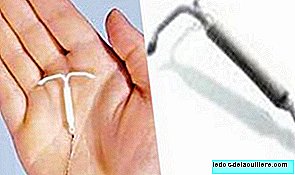
All parents know that the first bowel movements of the newborn are very characteristic, known as "meconium". Meconium is a thick, viscous, dark greenish-black substance that forms in the baby's digestive tract during pregnancy. It is the medical term to refer to the first stool of the newborn, which are usually expelled in several stools during the first 48 hours of the baby's life.
The meconium is composed of dead cells and secretions of the stomach and liver that lines the intestine of the newborn and is formed in the fetal period: amniotic fluid, mucus, lanugo (fine hair that covers the baby's body), bile and cells that they have detached from the skin and digestive tract.
During pregnancy, the baby in the mother's womb swallows amniotic fluid that contains all the other components mentioned above. To keep the amniotic fluid clear, clean and healthy, all contents other than this liquid itself are filtered and remain in the intestine, forming the meconium.
Meanwhile, the amniotic fluid is absorbed and released into the uterine space when the fetus urinates. This process of recycling Amniotic fluid occurs about every three hours.
In some cases, the baby ejects the meconium while still inside the uterus, which usually happens when the delivery date is approaching and the baby is under stress. Once the meconium passes into the amniotic fluid, it is possible for the baby to aspirate it into his lungs, which can cause an inflammation in the baby's lungs. A signal may be that meconium remains are observed in the amniotic fluid when giving birth.
It's funny the origin of the term "meconium", which derives from the Greek word "mekoni", with the meaning of 'numbing juice or opium'. Since Aristotle observed a relationship between meconium staining of amniotic fluid and a state of fetal sleep or neonatal depression, obstetricians have been interested in the well-being of the fetus when meconium is present in the amniotic fluid.
After having expelled the first meconia, the stool of the newborn baby will be the so-called "transition stool", from the third or fourth day of the baby's life and approximately until the first week. The main feature is the smell a rather strong smell and its appearance is liquid and greenish.
Once the remains of newborn intestine meconiumWhen the baby is fed with breast milk, the stools have a golden yellow color, and the texture of these is lumpy and soft. The artificial milk feces are characteristic by a light yellow-brown color, are more consistent and with whitish lumps.












